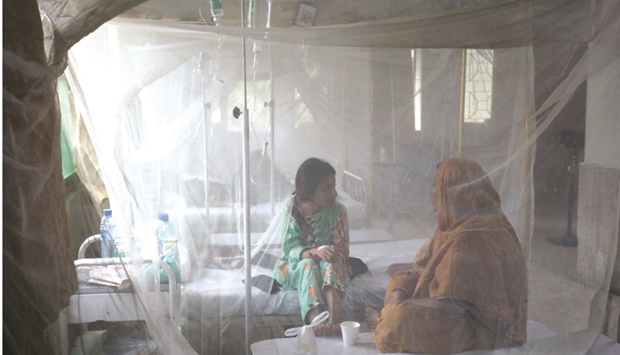Malaria cases are rampant in Pakistan’s flood-ravaged regions, with the death toll from diseases reaching 324, authorities said yesterday, adding that the situation may get out of control if required aid does not arrive soon.
Hundreds of thousands of people displaced by the floods are living in the open, and the stagnant floodwaters — spread over hundreds of kilometres which may take two to six months to recede — have led to widespread cases of skin and eyes infections, diarrhoea, malaria, typhoid and dengue fever.
France plans to host an international conference before the end of the year on climate-resilient reconstruction of Pakistan’s flood-affected areas. The announcement came after Pakistani Prime Minister Shehbaz Sharif and French President Emmanuel Macron had a bilateral meeting on the sidelines of the 77th Session of the UN General Assembly (UNGA) in New York, said a statement issued by Pakistan Ministry of Foreign Affairs.
More immediate help is needed for the displaced families are exposed to swarms of mosquitoes and other hazards, such as snake and dog bites.
They are in dire need of food supplies, shelter, medical assistance and medicines, which many complain have not been reaching them despite the efforts of the government and local and foreign relief organisations.
With Pakistan’s already weak health system and lack of support, displaced families have complained of being forced to drink and cook with unsafe water.
“We know it can sicken us, but what to do, we have to drink it to stay alive,” flood victim Ghulam Rasool told local Geo News TV as he stood near where his home was washed away in southern Pakistan.
“The aid is slow to arrive,” said Dr Farah Naureen, Mercy Corps’ country director for Pakistan, after visiting several submerged regions.
“We need to work in a coordinated manner to respond to their immediate needs,” she said in a statement late on Monday, prioritising clean drinking water. Health and nutrition stand out as the most important needs of the displaced population, she said.
Pakistan’s finance ministry said it had approved Rs10bn for the disaster management agency to use for procuring flood relief supplies and other logistics.
The Sindh provincial government yesterday said makeshift health facilities and mobile camps in the flooded areas had treated more than 78,000 patients in the last 24 hours, and more than 2mn since July 1. Six of them died, it said.
It confirmed 665 new malaria cases among internally displaced families over the same period, with another 9,201 suspected cases, adding that out of more than 19,000 patients screened in the last 24 hours across the province as a whole a quarter of them — 4,876 — were positive.

A patient suffering from dengue fever chats with a woman while sitting under a mosquito net inside a dengue and malaria ward at the Sindh Government Services Hospital in Karachi yesterday.
